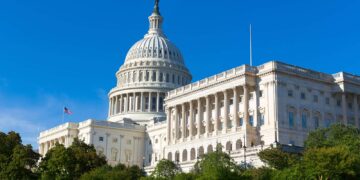Congress and cryptocurrencies haven’t historically been a match made in heaven. However, it seems that with talk of regulation swirling, some politicians are still keen on digital assets. Unusual Whales, a blog that tracks unusual market activity, recently released a report on how Congress traded cryptos last year. The results are worth examining.

Source: Shutterstock
So what cryptos were popular in Congress last year?
Bitcoin (CCC:BTC-USD) was, unsurprisingly, the king of Capitol Hill in 2021. Republican lawmakers Cynthia Lummis and Michael Waltz each purchased roughly $100,000 worth of BTC in 2021. Interestingly, a number of Congress members indirectly invested in crypto, either by investing in a Bitcoin or Ethereum (CCC:ETH-USD) trust, or investing in companies with stakes in crypto. This includes Rep. Marie Newman and Sen. Patrick Toomey, who purchased roughly $50,000 and $30,000 worth of Bitcoin via the Grayscale Bitcoin Trust (OTCMKTS:GBTC). Toomey also purchased Ethereum through the Grayscale Ethereum Trust (OTCMKTS:ETHE).
This is also the story for Speaker of the House Nancy Pelosi. Pelosi reported roughly $6 million in Nvidia (NASDAQ:NVDA) stock purchases, a company with substantial exposure to cryptocurrency. Given her average stock return of 25%, she clearly knows her way around the markets.
What else are Congress members buying?
Cryptos Abound Across Lawmakers’ Portfolios
Rep. Mark Green might have the most diverse collection of cryptos under his belt. In the spring of 2021, Green purchased Dogecoin (CCC:DOGE-USD), EOS (CCC:EOS-USD), Stellar (CCC:XLM-USD), Chainlink (CCC:LINK-USD) and more. Interestingly, Green is also the only member of Congress to sell off a portion of their crypto holdings.
Republican Rep. Barry Moore bought roughly $50,000 worth of Cardano (CCC:ADA-USD) and Ethereum last year. He is also an apparent pupcoin fan, making gains on the Dogecoin boom.
While only six Congress members actually hold cryptos, nearly 30 legislators are indirectly involved in the crypto game. Companies like Coinbase (NASDAQ:COIN), PayPal (NASDAQ:PYPL) and Nvidia each react to changes in the crypto space, making them a compelling alternative to direct ownership.
Ahead of impending regulation, the crypto market is clearly in flux. What’s unclear is how impending policy changes will affect Congress’ collective holdings. Time will tell if the U.S. Capitol becomes the next Doge Daycare.
On the date of publication, Shrey Dua did not hold (either directly or indirectly) any positions in the securities mentioned in this article. The opinions expressed in this article are those of the writer, subject to the InvestorPlace.com Publishing Guidelines.




